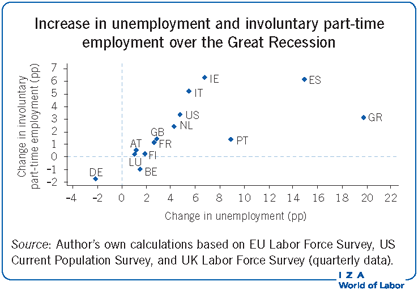Elevator pitch
The share of workers employed part-time increases substantially in economic downturns. How should this phenomenon be interpreted? One hypothesis is that part-time jobs are more prevalent in sectors that are less sensitive to the business cycle, so that recessionary changes in the sectoral composition of employment explain the increase in part-time employment. The evidence shows, however, that this hypothesis only accounts for a small part of the story. Instead, the growth of part-time work operates mainly through reductions in working hours in existing jobs.

Key findings
Pros
During the Great Recession, in the US and the UK the increase in the share of workers employed part-time accounted for the bulk of the drop in hours per worker and almost all its persistence during the recovery period.
The lion’s share of the cyclical variation in part-time employment is accounted for by changes in the rate at which workers move between part-time and full-time work at their current employer.
Because part-time workers are more likely than the unemployed to return quickly to full-time hours, the effects of part-time work on consumption are much lower.
Cons
The increase in part-time employment observed during recessions is mainly involuntary; either because business conditions are poor at the current job or because workers cannot find a full-time job.
Individuals who move from full-time to part-time employment experience a substantial reduction in earnings.
Several years after the end of the Great Recession, the involuntary part-time employment share remains above its pre-crisis level in the UK and the US; the causes behind this persistence are not well understood.